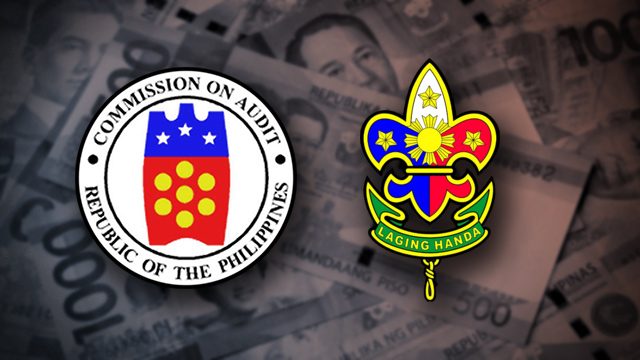SUMMARY
This is AI generated summarization, which may have errors. For context, always refer to the full article.

MANILA, Philippines – The Commission on Audit (COA) has asked officials of the Boy Scouts of the Philippines (BSP) to produce records that would support the validity of P221.167 million ($4.9 million*) in its total declared collections for 2012 and 2013.
The COA said that the BSP has failed to produce documents to show that registration fees collected over those years had been accurately listed and remitted to its account.
“The existence, accuracy, reliability and completeness of the registration fees (RF) and other affected accounts amounting to P114.305 million could not be determined due to unsubmitted journal entry vouchers; unmonitored and unaccounted official receipts, application for unit registration, and membership cards; and insufficient controls on collections,” the COA said.
It added, “This is a reiteration of a previous year’s audit observation and the cumulative effect to fund balance since that of CY 2012 amounted to P221.167 million.”
The amount of P114.305 million ($2.55 million) is only for the 2013 collections of the BSP. Aside from membership fees, the BSP also derives income from cash donations and sponsorships.
State auditors said that the BSP National Headquarters distributed official receipts (ORs) to its regional offices, National Scouts Shops, and Local Councils, but there were no records of the ORs being monitored and accounted for by the regional offices down to the local councils.
COA said that there “was no document submitted by the latter (regional offices) to show proof that these functions were indeed performed.”
“It is to be emphasized that the collectors were volunteers. Moreover, there was neither documentary trail nor policy in place relating to the safeguards over cash for collections made by these volunteers, other than trust,” it said.
Students joining the BSP pay a P50-membership fee, of which P40 is supposed to be deposited to the BSP accounts with Banco de Oro or the Philippine National Bank, while the remaining P10 is the share of the local council.
The local council was supposed to prepare a monthly collection report to be submitted to the regional office along with the ORs and deposit slips; the regional office will then prepare a summary of all the documents and sums for the national office.
The COA said it had no idea where all these documents went.
“There were no daily records of collections and deposits forwarded to the audit team. In view of the foregoing, the existence, reliability, and accuracy of these collections…could not be verified,” it said.
The current procedure, COA said, makes BSP funds vulnerable to “misappropriated cash.”
“Insufficient control and lack of transactions trail during the point of collections may result to undeclared and misappropriated cash,” it said.
On August 19, 1999, the COA issued a resolution that the BSP should be subject to state audit as a public corporation or a government instrumentality, which was upheld by the Supreme Court on June 7, 2011.
The High Court’s ruling that the BSP is considered a govenment-owned and -controlled corporation (GOCC) became final and executory on March 14, 2012. COA began auditing the BSP’s financial transactions in 2012. – Rappler.com
*$1 = P44.77
Add a comment
How does this make you feel?
There are no comments yet. Add your comment to start the conversation.